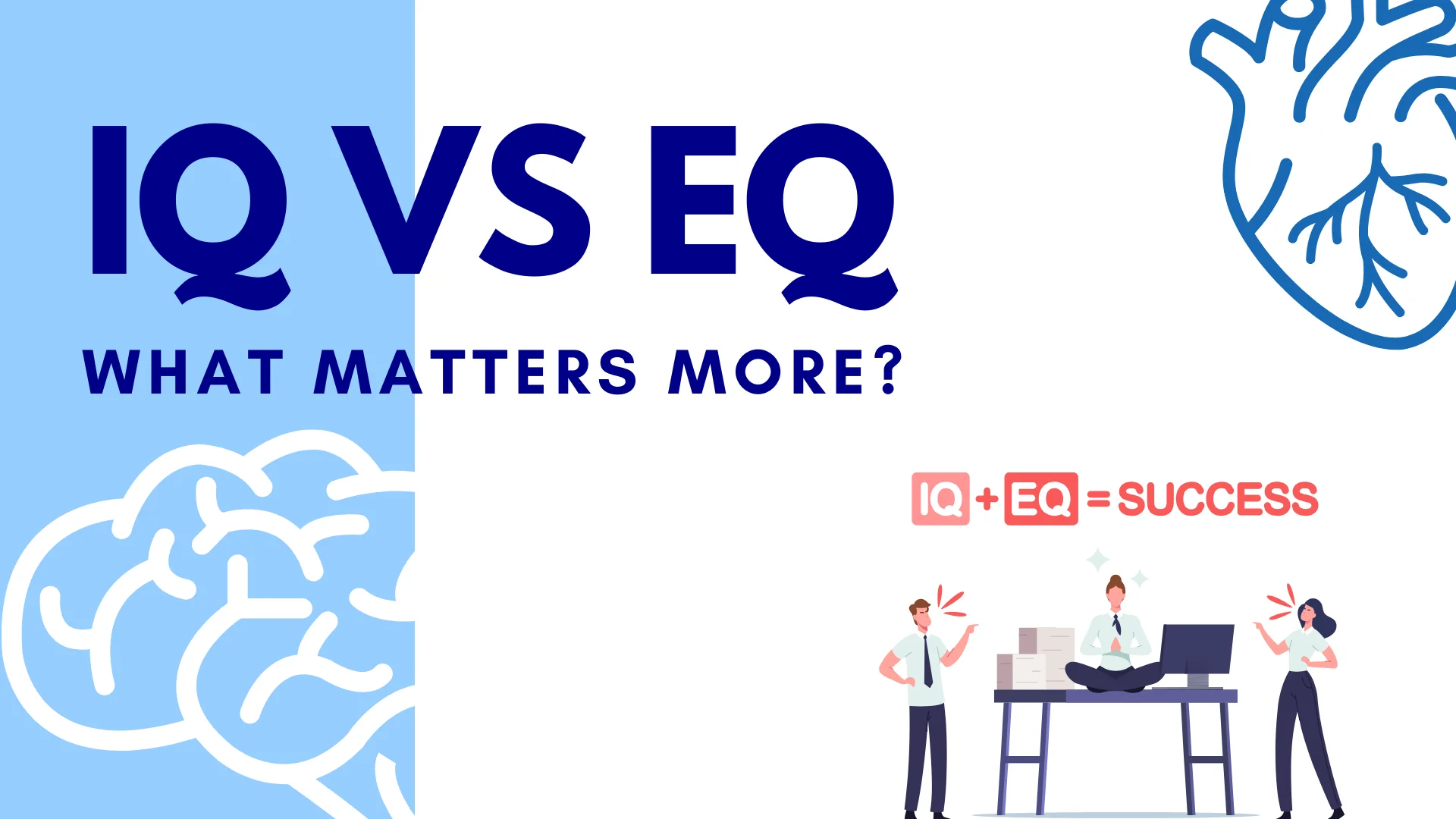EQ vs IQ | Can EQ Matter More than IQ?
Intelligence quotient tests have long been used to measure the cognitive abilities of people, but recent studies explored that success is not tied to high or low IQ but is related to emotional quotient (EQ). EQ is a new term coined by psychologists and intelligence experts who consider that IQ is important, but EQ plays a more pivotal role compared to IQ.
The majority of people confuse EQ with IQ, claiming that both are similar, but EQ refers to the ability to evaluate and understand the emotions of oneself and other people.
Studies have shown that people with a high ability to understand their emotions and other individuals are more successful compared to people with exceptional cognitive abilities. Let’s discuss the hot debate of EQ vs. IQ in detail and understand their significance.
Understanding IQ
In the past, people had an idea that some were more intelligent than others, but there was no scientific approach or test available to measure intelligence.
In 1905, a French Psychologist, Afled Binet, along with Theodore Simon, developed a test to measure the cognitive abilities of children.
The purpose of this test was to assess mentally disabled children, but still, it was not considered an IQ test.
A German psychologist, William Stern, introduced the concept of IQ in 1912 and improved the work of the Binet & Simon cognitive ability test.
The test was widely used in the army; later, it was misused by the German fascist government during World War 2 in order to execute low-IQ people and give chances to high-IQ citizens.
However, the test was later improved by another expert, Lewis Terman, who gave it a final shape.
Today, the IQ test is used to measure a person’s cognitive abilities in order to estimate his intelligence.
Experts claim that a person who possesses quick learning, excellent reasoning, and understanding abilities is an intelligent person.
He must have the desire to acquire knowledge and learn new skills. Some claim that a high IQ person should have incredible creative and outstanding critical thinking, logical reasoning capabilities, high self-awareness, and be able to find solutions to all problems, while others say that a person who can adapt quickly is intelligent.
Understanding EQ
Emotional quotient is the ability to understand oneself and other people’s emotions.
It may seem very strange to people who are unfamiliar with the depths of EQ because they claim that we all understand our and other people’s emotions, so what is new about it?
Basically, it is not only about understanding the emotions but also about reacting and understanding the responses of the people.
EQ is a newly coined term compared to IQ. In the past, people had the idea that some people could understand emotions better than others, but there was no idea about emotional intelligence.
Later, the term was coined in 1964 by Michael Beldoch. He claimed that along with cognitive abilities, we also have emotional abilities, but the idea was not famous around that time.
Later, multiple experts worked on intelligence and found out that we possess not only cognitive abilities but, more importantly, emotional intelligence.
They claim that the human brain is an advanced organ that processes data based on the rules of nature and reacts according to cognitive abilities, but the brain shapes these cognitive agencies, our worldview, and our reactions on the basis of our understanding of emotions.
The emotional brain is active 24/7 and plays a pivotal role in our daily lives, from reading to writing to watching a match or finalizing a business deal. Our emotional brain plays a significant role compared to cognitive abilities.
Experts argue that EQ is important for strong relationships, leadership, decision-making, and stress management.
Emotional Intelligence: Why It Can Matter More Than IQ?
After discovering that humans have multiple types of intelligence instead of IQ, and all are equally significant, a hot debate between EQ enthusiasts and IQ experts was initiated. Some claim that IQ is more important, while others argue that EQ plays a significant role.
IQ is important in some fields; for example, a scientist should have a high IQ in order to understand natural phenomena. On the other hand, EQ is important in business, leadership, human resources, healthcare, counseling, and entertainment. We cannot say that one is more important than the other because both EQ and IQ are significant for related fields.
Real-Life Examples
Studies have shown that successful businessmen have High EQ, such as Elon Musk, Bill Gates, and Jeff Bezos, famous movie stars De Caprio, Tom Cruise, and Julia Roberts, and music artists, such as Michael Jackson, Elvis Presley, and Madonna. On the other hand, famous scientists had high IQs, including Albert Einstein, Isaac Newton, and Stephen Hawking, as well as well-known mathematician Terence Tao and chess master Robert Byrne.
When we analyze the data of people with high EQ and IQ, we find that EQ is important for cooperation and competition, while IQ is significant for discoveries and inventions. Because the human brain processes all the data in the context of emotions, experts argue that EQ plays a crucial role compared to IQ.
IQ and EQ apparently seem opposite, but both are crucial for human survival. We cannot ignore the importance of IQ, nor can we consider EQ more significant, as both are important for our society. Anyhow, I have explained everything about IQ vs EQ, I hope this information will help you in the future; thank you.
Take a Real IQ Test Online!
Take a comprehensive 100-question test and see whether you are more intelligent than Einstein or not.

